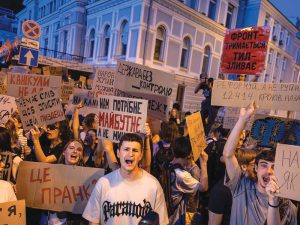No products in the cart.
Ukraine: Higher ed reforms war

Varsity students protesting Russian invasion
The ongoing process of higher education reform in Ukraine has divided opinion in the sector: while some highlight “significant progress” made in recent years, others have condemned developments including a tuition fee increase.
In June, the government announced that the minimum tuition fee would increase for almost a third of subject areas, with a particular focus on specialisations with which the labour market is considered to be oversaturated, among them law, management and economics.
Stanislav Nikolaienko, president of the National University of Life and Environmental Sciences of Ukraine (NUBiP) and minister of education and science from 2005 to 2007, says the fee increases have “shocked” the public and “sharply limit access for young people to these specialties”, adding: “We are a warring country, and citizens’ incomes are low.”
Tetyana Kaganovska, rector of V. N. Karazin Kharkiv National University, takes a more positive stance, telling THE that “Ukraine has demonstrated significant progress in reforming higher education” in recent years. The Ukrainian government “does consider higher education and research a priority,” she says. “Universities have gained greater academic autonomy, the requirements for quality of educational programmes have increased and the accreditation system has improved,” says Kaganovska.
Describing attitudes towards the reform process as “varied” across the academic community, Kaganovska says lack of resources to implement new initiatives was a particular source of frustration: “Many innovations require modern infrastructure, digital platforms, staff retraining and international cooperation. All of this demands funding.”
Nadiya Ivanenko, honorary fellow in the University of Oxford’s department of education, says the reform process was inevitably interrupted by Russia’s full-scale invasion of Ukraine in 2022. With many young people leaving the country to escape the war, “a lot of universities are losing a huge amount of students, and they just can’t function as a university,” says Ivanenko.
Kaganovska describes the fall in international student numbers, also fuelled by the Russian invasion, as one of the “greatest losses for Ukrainian universities”. In an “ideal world”, Kaganovska says, “I would like to see systemic, consistent, and well-coordinated reforms”. Among them financial reform including “increasing state investments in science and higher education, incentivising grants acquisition, public-private partnerships, and donor support”.
NUBiP’s Nikolaienko says Ukrainian universities’ “strategic goals”, should also include “updating content of programmes, taking into account the war and state reconstruction, digitalisation and the introduction of artificial intelligence into the educational process”.
(Excerpted and adapted from The Economist and Times Higher Education)















Add comment